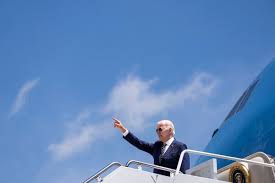
Fulfilling President Biden’s 2024 vow that “on my watch” federally funded projects will be made with American products, the Department of Transportation’s Federal Highway Administration (FHWA) terminated a 40-year-old waiver of manufactured products used in federally funded highway projects. This is likely the most significant measure taken by the Biden administration in its campaign to curtail the use of waivers of domestic content requirements—a central aim of the president’s 2021 Made in America order. This post reviews this final action by the Biden administration to embed its Buy America policies into the US procurement system.
On January 14, the FHWA issued a final rule amending its Buy America regulation to terminate its Manufactured Products General Waiver and establish Buy America requirements for manufactured products used in federally funded highway projects. (It issued a proposed rule in March 2024.) With the final rule, the FHWA rescinded its 1983 determination that it was in the public interest to waive the Buy America requirements for manufactured products permanently incorporated into federal-aid projects. It based its reversal on its conclusion that the Manufactured Products General Waiver is overly broad, no longer in line with the purpose of domestic content preferences and waivers, and therefore no longer in the public interest.
In the final rule, FHWA established standards for Buy America requirements that will apply to manufactured products on federal highway projects. These standards are substantially similar to those established by the Office of Management and Budget for manufactured products subject to the Buy America, Build America Act. To be considered ‘‘produced in the United States’’ and therefore Buy America-compliant, manufactured products must be manufactured in the US (final assembly requirement) and have greater than 55% of the manufactured product’s components, by cost, be mined, produced, or manufactured in the US (55% requirement). The application of these two requirements will be phased-in in October 2025 and October 2026, respectively.
When the final rule becomes effective on March 17, 2025, the Manufactured Products General Waiver will remain in place until October 1, 2025, when the final assembly requirement becomes effective for federal highway projects obligated on or after that date. Similarly, the waiver will continue to apply until October 1, 2026, when the 55% requirement becomes effective for projects obligated on or after that date.
This means that for federally funded highway projects obligated on or after October 1, 2026, all manufactured products permanently incorporated into the project must both be manufactured in the US and the cost of their components that are mined, produced, or manufactured in the US must be greater than 55% of the total cost of all components of the manufactured product.
The FHWA outlined the expected benefits and costs associated with ending the manufactured goods waiver and establishing Buy America requirements for manufactured products. The benefits include protecting and expanding domestic manufacturing, increasing supply chain resiliency, and increasing consistency in applying domestic content procurement preferences for manufactured products between FHWA and other federal agencies.
As for its expected costs of ending the waiver, the FHWA cited increased material costs for manufactured products used in highway construction projects, project delays, and the administrative costs to FHWA and recipients of its financial assistance. FHWA estimated the increased material costs to range from $41 million to $980 million per year. The agency further estimated an additional $22 million per year in increased administrative costs to recipients of its financial assistance and an additional $167,000 per year in its own administrative costs. Overall, FHWA estimated the 10-year costs of ending the waiver to range from $545 million to $8.5 billion.
Both supporters of rescinding the manufactured goods waiver and those in favor of continuing the waiver submitted comments to FHWA. Those opposing the waiver contended, inter alia, that its rescission would stimulate economic growth, create and protect American jobs, restore America’s manufacturing base, increase national security by minimizing dependence on foreign sources, and ensure that taxpayer funds go to US businesses.
Commenters in favor of continuing the Manufactured Products General Waiver included those who opposed domestic content preferences entirely, stating they run counter to free trade agreements and negatively affect the countries that use them. Many opponents of removing the waiver argued that there will be an insufficient number of Buy America-compliant manufactured products, either because of a lack of current supply or because of increased demand for compliant products, resulting from the removal of the waiver. Many argued that termination of the waiver would result in fewer projects or projects of lesser quality.
many argued that there will be an insufficient number of Buy America-compliant manufactured products,
Given his support for Buy American policies in his first term, President Trump is unlikely to reverse those implemented by the Biden administration in his return to the White House.
Jean Heilman Grier
January 16, 2025
Related Posts

